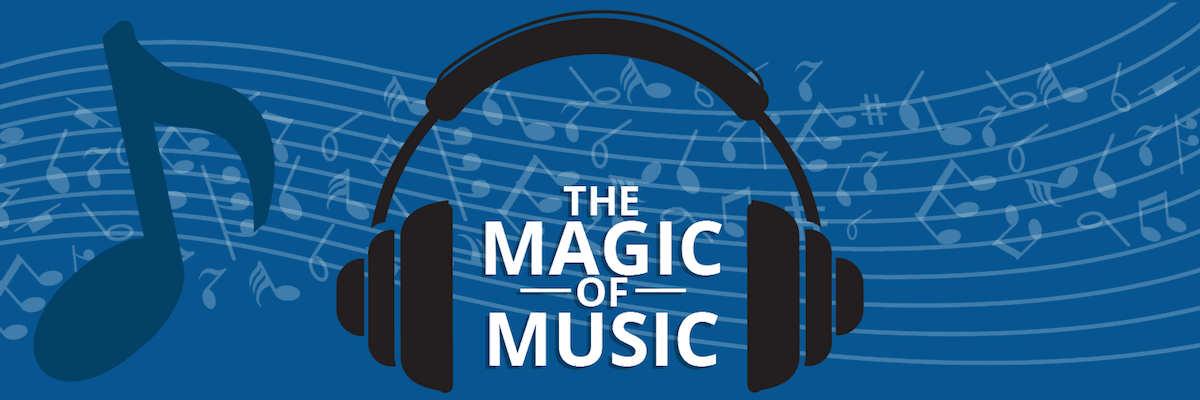Do you ever go a day without listening to some type of music? You probably don’t, and that’s because music is all around us. We hear it in stores, coming from car stereos, and of course our own headphones! Music transcends time and cultures and finds its way into all of our lives. Pretty cool, right?
Despite its presence in our lives, there’s still a lot we don’t understand about the effects of music on our minds and bodies. For example, why does your voice sound so different on recordings? Are you really tone deaf? Scientists have come up with some theories to explain these and other musical phenomena.

Why do songs get stuck in my head?
It happens to all of us, out of the blue a song pops in our head and it’s stuck there on repeat. Maybe the chorus really is just that catchy, but it’s also a phenomenon called earworms. Luckily these aren’t literal worms, just a term that refers to songs that get stuck in your brain. It’s difficult to say for sure why this happens, but some researchers have concluded that it comes from listening to a song many, many times. The interesting part is, it doesn’t have to be a song you’ve listened to recently.
Songs played on the radio are the most common earworms, since we hear them often. They typically pop into our heads when we’re doing something mindless or routine. One researcher found that people often have positive emotions after having an earworm and when asked to sing it back, what they sing is almost exactly like the original. Perhaps the purpose of earworms is to help our memory and make us happy?
Why does my voice sound different on recordings?
Most people would agree, the sound of their own voice is just not pleasant. Few people listen to a recording of their own voice without asking, is that really me? Studies have shown, this has to do with the way we hear. Sound is carried along two paths, and when we speak we hear the sound that comes from our vocal chords up to our ear. When we hear a recording of our voice, that “normal” sound we hear is gone and what is left is the sound that travels through the air back to our ears.
Am I really “tone deaf”?
Good news! Just because you may be bad at singing doesn’t mean you are actually, in fact, tone deaf. Amusia is the technical term for tone deafness and it actually only occurs in 1 out of every 20 people. For most people, the ability to process sound and match pitch and rhythm can be learned with musical training. Maybe some singing lessons are in your future?
Why are some people so bad at keeping rhythm?
Have you ever been in a group listening to music and everyone is snapping or clapping along to the beat but there’s that one person who just cannot keep the rhythm? This is an actual scientific condition called being “beat deaf”. While many people may have some trouble matching a beat, very few are actually beat deaf. These people have no problem clapping or snapping when there’s no sound, but the problem is presented when they try to synchronize with a sound such as music. This inability to remain on beat with music may have to do with their own internal rhythms.

Why do I get chills when listening to music?
Some songs, or parts of a song, will give you goosebumps, or chills. Why does this happen when listening to music? This phenomena, called musical frisson, is due to the pleasure that comes from hearing music and the release of dopamine. Scientists have found that it can even happen when the pleasure is anticipated. This explains why music, which has no survival value, is so important to human society.
Why do certain artists and songs bring back memories?
The title or first few notes of a song can bring back strong memories or feelings. It has long been recognized that music is tied to memories and though it is very difficult to say exactly why this happens, studies have shown that listening to music does bring back feelings of nostalgia or takes us back to a specific time and place. This could be because music triggers our conscious and unconscious memory. Songs of a particular era remind us of what we did during those times, or a certain artist reminds us of an old relationship, possibly because music is quite literally the soundtrack of our lives. Psychologists are now discovering how to help patients with Alzheimer’s and dementia by using music to assist their memory.
Does music really help you exercise?
For the vast majority of people, music is a legal performance enhancer. It helps them exercise harder, longer, and faster. This could be due to the fact that music acts as a distraction from the pain and fatigue you’re experiencing. Most people naturally move to a beat and keep up with the tempo. This is why the majority of workout playlists are comprised of high energy, uptempo songs. Moving rhythmically to the beat can even help conserve energy.

Why do I love listening to sad songs?
It’s no surprise that upbeat music can enhance our mood, but why then do we also enjoy listening to sad songs? Much like venting, research has shown that listening to sad music helps us release the emotional sadness and distress we may be feeling. We also experience the above-mentioned musical frisson more often with sad songs due to the release of prolactin and oxytocin, which are bonding and nurturing chemicals. In effect, listening to sad music can actually help us regain our positive and happy mood.
You’ve probably experienced one if not all of these musical phenomena, and now you have an idea of why they happen! Whatever genre is your favorite, whatever artist takes you back to your favorite summer in high school, or whatever song gets stuck in your head, the connections we have with music are deeper and more amazing than we even thought!


